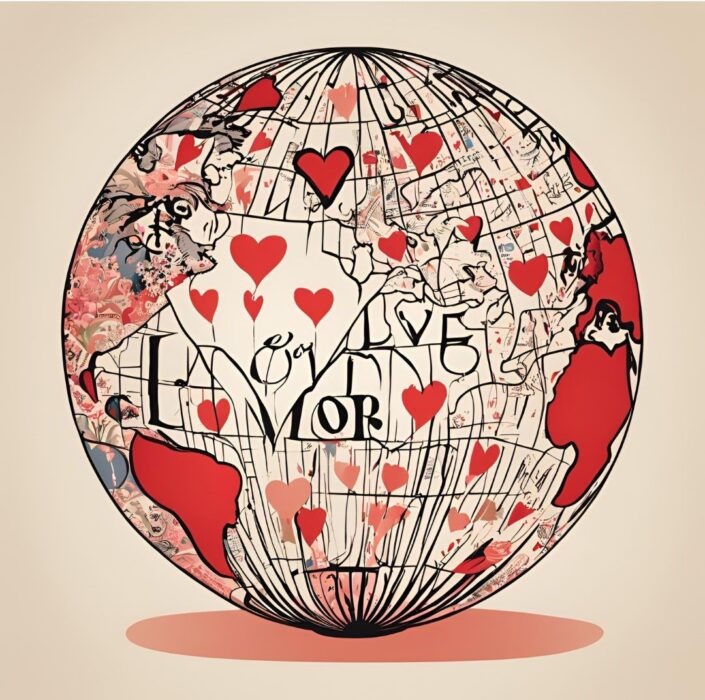Falling for someone with a different first language than you adds a whole extra layer to the relationship and the way you are able to communicate. Even when one or both people are nearly fluent in the other language (or a common one) there are always nuances, cultural implications, and context to language that are incredibly hard to pick up on if you are not a native speaker. When it comes to bilingual love, you have two people who grew up in different worlds, and that’s what this poem looks at. It’s the idea that even if you learn new languages, the first one you learned is the one that gave you language in the first place, gave every object and feeling a name. So, you came to give meaning to things in a different way than someone who grew up with a different language.
This particular poem is written by an English speaker falling in love with a Spanish speaker, as you’ll quickly see, but I think the ideas translate to any bilingual love. I hope you enjoy it.
PS. There are a few Spanish words sprinkled throughout, but don’t worry if you don’t speak Spanish. Most of them you can either get from context, or don’t really need to know to understand the poem. But if want to make sure you catch every word, there’s a note on translation at the end.
The Language of Love

When I was a child I learned everything had a name –
chair, apple, book, hope,
love.
These things became their names,
each new word the key to a part of the world
I had yet to discover.
For how could I love if I didn’t have
a word for it?
A feeling without a name does not know
how to be shared.
A feeling without a name cannot be anything
but lonely.
But you grew up in a different world
where everything had a different name.
We both pet gatos, ran afuera, laughed with our amigos
but I called them cats,
knew it as outside, had only
friends.
My first besito was with a boy who taught me
to love, in the way you love when
you’re 14. Eagerly but timidly, carefully
at first, treading new waters, and then
recklessly
still unaware of the word
heartbreak.
Still unaware of the palabra
corazón roto.
Did your primer amor make you feel
temerario?
In school, I learned to structure my thoughts
with grammar rules and punctuation.
Adjectives must come before a noun,
and why would nouns have a gender?
But to you honey, flowers, luck
and the night were feminine,
while masculinity kept its hold
on books and days and amor.
When I felt a certain way, I would become
my feeling. I am hungry, I am hopeful, I am
scared.
But you? You could only have
hambre, esperanza,
miedo.
Do feelings feel different
when you don’t become them?
Do feelings feel different
when you call them by another name?
I’ve heard people say they have
two personalities,
one for each language they speak.
So, tell me, what are you like en Espanol?
Are you just as easy to make laugh?
Are you as honest? Do your abrazos feel as safe?

When I tomar tu mano and you susurrame al oído,
what would you say if I could understand you
perfectly? What feelings would I have
if I didn’t translate each
word?
With my eyes locked into yours, the word
at the tip of my tongue, I don’t know
if I can estrenar it yet.
Still learning to define love in my own language,
I know what I feel is more than like.
So I borrow from your world, a word I grew up
without. A word I learned by feeling.
Te quiero, te quiero, te quiero.
Thanks for reading!
Let me know what you thought of this bilingual love poem and if you can relate!
Spanish Notes
Just in case you need help with some of the Spanish, here’s a translation for the words I used. At least a translation to the best of my understanding as a Spanish learner.
gatos: cats
afuera: outside
amigos: friends
besito: a little kiss, beso means kiss and ito is a diminutive that makes the word you attach it to smaller, cuter, and more endearing.
palabra: word
corazón roto: heartbreak
primer amor : first love
temerario: reckless
hambre: hunger
esperanza: hope
miedo: fear
abrazos: hugs
tomar tu mano: take/grab/hold your hand
susurrame al oído: whisper in your ear
estrenar: to do something for the first time. There is not a direct translation for this.
te quiero: this is I love you but not to the same intensity as te amo which also translates to I love you but is stronger and more romantic.
Check out these other poems related to travelling:
- Running Away From a Home I Haven’t Yet Built is a poem for people who feel like they are still searching for a home.
- A Poem From Manang is a poem I wrote in Nepal about the uncertainty of life and love.
- A Travel Romance Poem: Love For a Moment is about about falling in love while travelling, knowing it won’t work out but doing it anyway.
- A Poem About a Once in a Lifetime Travel Moment is a poem about a magical moment in Laos that I didn’t get on camera, and how that affects the memory. There is actually a reference to this moment in Laos in the poem Love For a Moment as well.
- A Heartwarming Travel Poem About Guatemala is a poem about a travel moment in Flores Guatemala that gave me some insight about some of the cultural differences between Guatemala and North America.
- Silence is a poem about, well, silence and what it can represent. Not just silence in the literal sense, but silence as a feeling.
- Ocean Meditation explores all the things you can learn from the ocean and the feelings they bring up.
- Or check out more of my poetry on instagram @everywhereshetravels.poetry.


